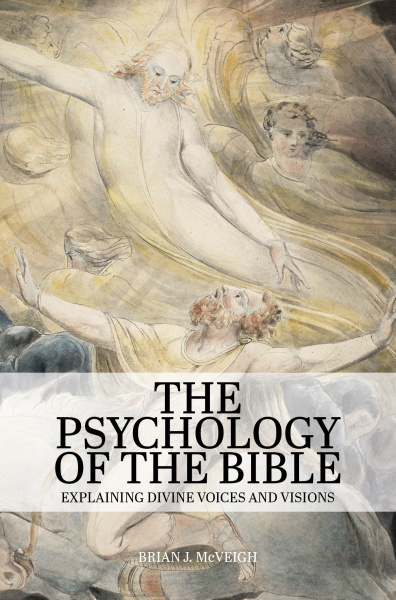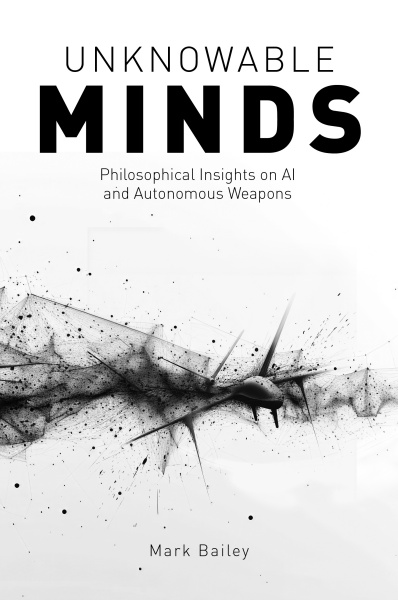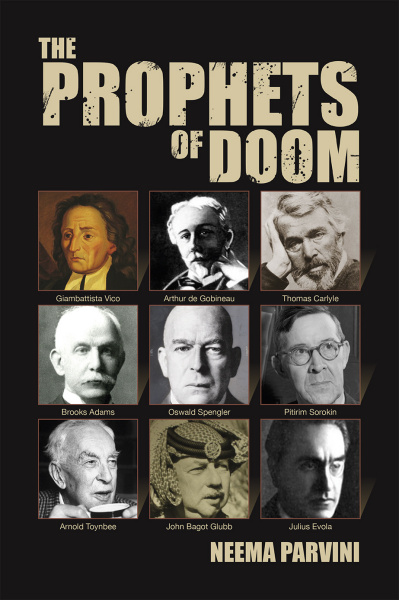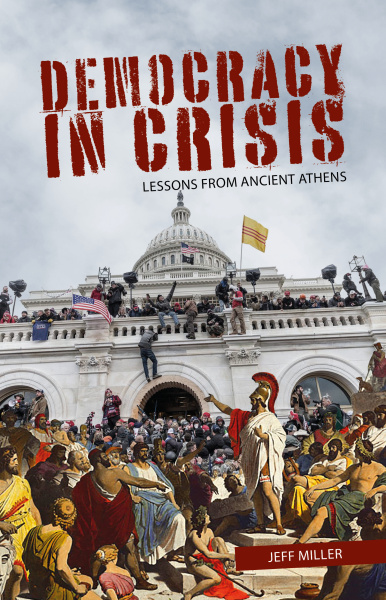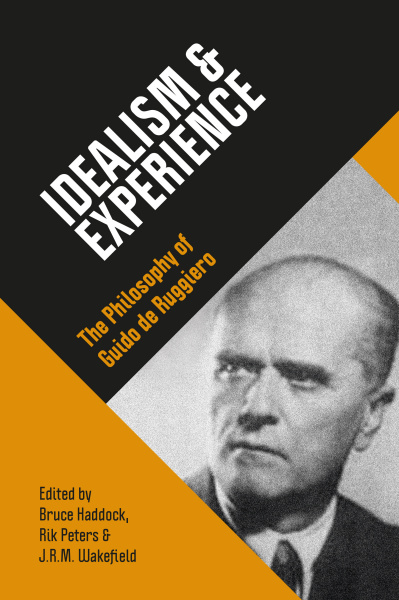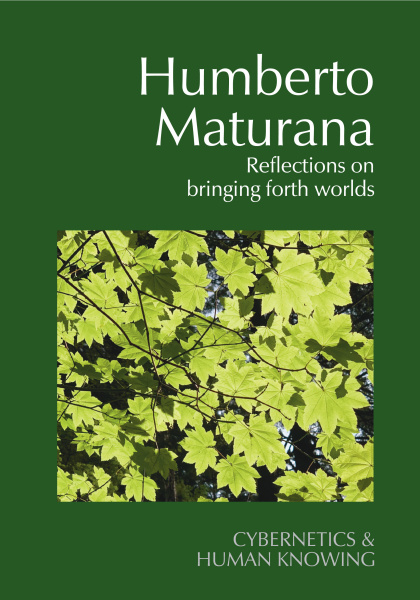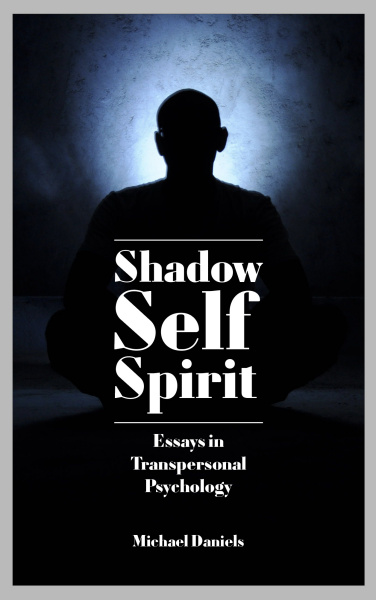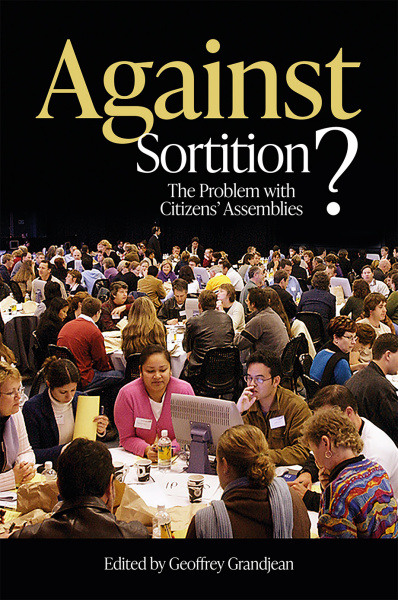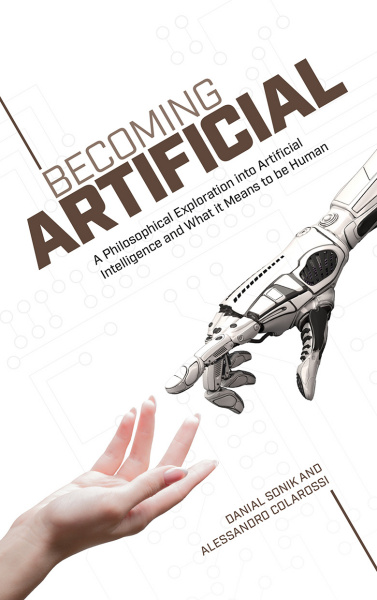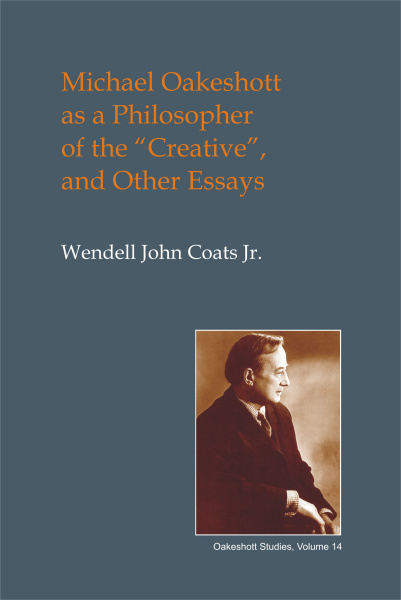Imprint Academic
-

Politics of Random Selection
Making Good Use of Sortition
Gil Delannoi begins with a general theory of political procedures and its relations with the typology of political regimes. Sortitive democracy is also studied as a third type distinct from the representative and direct types. Sortition is analysed through its main uses, effects, and objectives.
-

Against Sortition?
The Problem with Citizens' Assemblies
This book presents the institutionalization of sortition while questioning its political consequences in terms of representation and deliberation. Several examples are used, such as the Citizens' Climate Convention in France and the Conference on the Future of Europe.
-

Democracy in Crisis
Lessons from Ancient Athens
From the storming of the Capitol and the rise of authoritarian rhetoric and politicians to the challenge of global warming, liberal democracy faces a twin crisis of legitimacy and efficacy. Democracy in Crisis points to long neglected resources from the world's first democracy - Ancient Athens - prompting us to think beyond our current practices.
-

Idealism & Experience
The Philosophy of Guido de Ruggiero
Idealism & Experience: The Philosophy of Guido de Ruggiero comprises eight new critical essays, as well as English translations of five of de Ruggiero's most important shorter writings, which chart the development of his thought between 1914 and 1946.
-

Identity Politics and Tribalism
The New Culture Wars
This book guides the reader through a journey that connects the dots on the various fronts of the culture wars. There is a thread that links together the expressions of group and identity conflicts in today's West: from Left to Right, from SJWs to Trumpites, from feminism to the manosphere, and from critical race theorists to white nationalists.
-

The Blind Guardians of Ignorance
Covid-19, Sustainability, and Our Vulnerable Future
Politicians, business leaders, and sustainability experts have assumed that market forces will drive the transformation to sustainability. This book explains in clear language why this view is wrong and what we need to do to prepare for the future of humanity. Governments will have a key role to play in this process, and they need a wake-up call.
-

Iconoclasm, Identity Politics and the Erasure of History
This book surveys the origins, uses and manifestations of iconoclasm in history, art and public culture. It is one of the first books to examine the outbreak of iconoclasm in Europe and North America in the summer of 2020 in the context of previous outbreaks.
-

Sortition and Democracy
History, Tools, Theories
This book offers a historical analysis of sortition. It brings together a number of the best specialists on political sortition from antiquity to contemporary experiments, in Europe but also in the Ancient Middle East and in imperial China. It demonstrates that sortition has been a crucial device in political history.
-

ZAP
Free Speech and Tolerance in the Light of the Zero Aggression Principle
In ZAP, Gerard Casey presents a critical and unified approach to both free speech and tolerance based on the Zero Aggression Principle, keeping the critical discussion topical and grounded by reference to current events.
-

Democracy — A Work in Progress
An Irreverent Exercise in Political Thought
In this personal, and sometimes challenging, work the author argues that an idealised form of political government has been the goal of mankind since Plato himself. But political thinking has always been a theoretical exercise detached from reality. Little consideration was given to the fact that it is flawed humans who must implement these ideas.
-

The Nature of Goods and the Goods of Nature
Why anti-globalisation is not the answer
The Nature of Goods and the Goods of Nature unfolds a voyage of awareness that links our everyday experiences with the economic theory of the nature of goods to the goods of nature — human nature, social nature, and the environment — that are essential for all of us in our quest for happiness and prosperity.
-

The Tribe
The Liberal-Left and the System of Diversity
In The Tribe, Ben Cobley guides us around the 'system of diversity' that has resulted from identity politics, exploring the consequences of offering favour and protection to some people but not others based on things like skin colour and gender.
-

Faking the News
What Rhetoric Can Teach Us About Donald J. Trump
In Faking the News, eleven prominent rhetoric experts explain how Trump's persuasive language works. The authors explain Trump’s persuasive uses of demagoguery, anti-Semitism, alternative facts, populism, charismatic leadership, social media, television, political slogans, visual identity/image, comedy and humour, and shame and humiliation.
-

Michael Oakeshott: Notebooks, 1922-86
The sixth volume in the series Michael Oakeshott: Selected Writings. From the 1920s to the 1980s Oakeshott filled dozens of notebooks with his private reflections, both personal and intellectual. Their contents range from aphorisms to miniature essays, forming a unique record of his intellectual trajectory over his entire career.
-

Freedom's Progress?
A History of Political Thought
Freedom's Progress is a history of Western political thought, a conceptual map as it were, tracking the fitful journey of one particular concept — liberty — through time. The book covers the full philosophical canon — from Plato to Rawls — but is written from the perspective of the libertarian tradition of Ludwig von Mises and Murray Rothbard.
-

The Place of Michael Oakeshott in Contemporary Western and Non-Western Thought
Essays by contributors from Britain, Canada, Hong Kong, India, and the USA provide a comprehensive critical assessment of the principal aspects of Oakeshott's thought that account for his contemporary relevance.
-

The Chamberlain Legacy
In this book, the author has sought to re-examine the reputations of the Chamberlains by concentrating as much on their personal lives and the motives that drove them as on the mighty political events that dominated their times. His conclusions may surprise the reader.
-

Lord Kames
Selected Writings
Library of Scottish Philosophy volume containing selected writings of Henry Home, Lord Kames, judge, jurist and philosopher.
-

Your Brain's Politics
How the Science of Mind Explains the Political Divide
In this brief introduction, Lakoff and Wehling reveal how cognitive science research has advanced our understanding of political thought and language, forcing us to revise common folk theories about the rational voter.
-

The Demarchy Manifesto
For Better Public Policy
Demarchy exploits the possibilities of modern communications to give new role to public discussion. It takes the initiative in formulating policy on each specific problem out of the hands of political parties and into the hands of those most strongly affected by that particular problem. John Burnheim explains why this needs to be done.
-

Playing the Long Game
How to Save the West from Short-Termism
This book explains how short-termism is damaging our economy and what we can do about it.
-

Orwell's Faded Lion
The Moral Atmosphere of Britain 1945-2015
This book confronts the actual direction taken by British society against the background of the high hopes of the generation that survived the war.
-

New Labour's Old Roots
Revisionist Thinkers in Labour's History
Fully updated and revised edition of New Labour's Old Roots.
-

The Legendary Past
Michael Oakeshott on Imagination and Political Identity
The book explores Oakeshott's thought on the key role human imagination plays in relation to the political.
-

History as Thought and Action
The Philosophies of Croce, Gentile, de Ruggiero and Collingwood
This is the first book-length study of the relationship between Benedetto Croce (1866-1952), Giovanni Gentile (1875-1944), Guido de Ruggiero (1888-1948) and Robin George Collingwood (1889-1943).
-

General Will in Political Philosophy
This book deals with the role and place of the general will in modern and contemporary political thought.
-

In the Name of the People
Pseudo-Democracy and the Spoiling of our World
Are our 'democracies' truly democratic? In the Name of the People examines the myth of modern democracy and finds it wanting.
-

Civil Society, Capitalism and the State
Part Two of the Liberal Socialism of T.H. Green
This book presents a critical reconstruction of the social and political facets of Thomas Hill Green's liberal socialism. It builds on Colin Tyler's The Metaphysics of Self-realisation and Freedom (2010), although it can also be read as a freestanding work.
-

There is No Such Thing As a Free Press...
And we need one more than ever
The aim of this book is to a launch a polemic for the freedom of the press against all of the attempts to police, defile and sanitise journalism today.
-

Moored to the Continent?
Future Options for Britain and the EU
Is there an alternative to EU membership? What if Britain left the EU? Would it be a disastrous or liberating experience? What trade relationships could the UK forge outside the EU? How would economic and social policy be different? What are the implications for sovereignty and democracy? This text seeks to answer these questions.
-

Reaction
Against the Modern World
In this book the author explores the different facets of reaction and suggests that there is more to the concept than just a gratuitous insult.
-

Politics and Neo-Darwinism
And other essays
This collection of essays is eclectic, covering certain political, ethical, cultural and philosophical topics. But running through all the material is the evolutionary-naturalistic perspective stated in the opening essay.
-

Natural Law, Economics and the Common Good
In this volume a distinguished set of authors explore various economic, philosophical, and ethical ideas from historical, contemporary, and future-looking perspectives.
-

Friendship and the Political
Kierkegaard, Nietzsche, Schmitt
This book reappraises the idea of "friendship" in contemporary political thought. The author explores the possibilities for theorising friendship in modern times through an examination of three seminal thinkers: Kierkegaard, Nietzsche and Schmitt.
-

The Scottish Political System Since Devolution
From New Politics to the New Scottish Government
This book presents a narrative of Scottish politics since devolution in 1999.
-

The Meanings of Michael Oakeshott's Conservatism
This collection of recent scholarship on the thought of Michael Oakeshott includes essays by both distinguished and established authors as well as a fresh crop of younger talent. Together, they address the meanings of Oakeshott's conservatism through the lenses of his ideas on religion, history, and tradition.
-

Lotteries in Public Life
A Reader
Until recently, there was no theory to make sense of lotteries and what they can do. The past few decades have changed that with a veritable renaissance of studies on lotteries. This book collects fourteen of the most important of these papers, and offers a critical introduction tying them together.
-

Against All Authority
Anarchism and the Literary Imagination
This volume examines historical and contemporary engagements of anarchism and literary production.
-

Britain In a Global World
Options for a New Beginning
This edited collection explores the future options for the UK regarding its relationship with the European Union (EU). the effective choice Britain possesses is between an essentially European future or a comprehensive global strategy. Contributors include: Ruth Lea, Matthew Elliott, Patrick Minford, Ian Milne, David Lascelles.
-

On Liberty and Peace Part 2
Peace
The author writes: In this project I set out to provide an answer to two fundamental questions of political philosophy. How can human beings live together, in conditions of co-operation over time, enjoying what Kant famously called 'perpetual peace'? And how much individual freedom can we expect to enjoy?
-

The Sarkozy Phenomenon
In this short book the author argues that the Sarkozy phenomenon is best explained by principal reference to the notion of Bonapartism, which of course has a long history in French politics.
-

Democracy and the Fall of the West
Democracy is killing the West. That is the stunning conclusion of this book that tears apart the consensus underpinning modern political assumptions. It argues that the secret of the West's success is not Democracy, but Liberalism.
-

Christian Anarchism
A Political Commentary on the Gospel: Abridged Edition
Christian anarchism has been around for at least as long as "secular" anarchism. The existing literature cites Leo Tolstoy as its most famous (sometimes even as the only) proponent, but there are many others. This book presents Christian anarchism to both the wider public and the wider academic community.
-

The Authentic Tawney
A New Interpretation of the Political Thought of R.H. Tawney
This book provides a fresh and accessible guide to the ideas of R.H. Tawney for new readers and to set straight the record of what Tawney's political thought really is, warts and all, in place of the rather over-simplified picture painted by the major commentators.
-

Michael Oakeshott: Early Political Writings 1925-30
A discussion of some matters preliminary to the study of political philosophy' and 'The philosophical approach to politics
This volume contains two previously unpublished works, a manuscript entitled 'A Discussion of some Matters Preliminary to the Study of Political Philosophy', and the first version of a course of lectures on 'The Philosophical Approach to Politics' that Oakeshott gave between 1928 and 1930.
-

The Metaphysics of Self-realisation and Freedom
Part One of the Liberal Socialism of Thomas Hill Green
This first part of Colin Tyler's new critical assessment of the social and political thought of T.H. Green (1836–1882) explores the grounding that Green gives to liberal socialism.
-

The Legacy of Leo Strauss
This volume of essays opens up the topic of Leo Strauss and the Straussians to those outside the relatively narrow circles who have been concerned with him and his followers up to now.
-

Sortition
Theory and Practice
Essays deriving from the conference "Selection by Lottery: Theory and Practice" held in 2008 under the auspices of Sciences Po, in Paris.
-

On Liberty and Peace, Part 1
Liberty
The author writes: In this project I set out to provide an answer to two fundamental questions of political philosophy. How can human beings live together, in conditions of co-operation over time, enjoying what Kant famously called 'perpetual peace'? And how much individual freedom can we expect?
-

Columbanus
Poet, Preacher, Statesman, Saint
Columbanus ("The Dove of the Church"), not to be confused with his near-contemporary Columba of Iona, was a towering figure in the religious and political life of Europe in the Dark Ages. In this lively biography of the saint, Carol Richards evokes the violent and unstable age that laid the foundations for the achievements of the Middle Ages.
-

Premiership
The Development, Nature and Power of the Office of the British Prime Minister
This book combines the methods of history and political science to produce theories of the development, nature and power of the premiership, and to explain the implications for present politicians and analysts.
-

Economic Reform and a Liberal Culture
And Other Essays on Social and Cultural Topics
This second collection of essays for the Societas series by Tom Rubens continues the author's discussion of contemporary issues contained in "Progressive Secular Society" (Imprint Academic 2008).
-

Poverty or Prosperity?
What Tax is Best for a Flourishing Economy
A collection of essays by leading economists on how different tax regimes affect the overall prosperity of a country.
-

Christian Anarchism
A Political Commentary on the Gospel
Christian anarchism has been around for at least as long as "secular" anarchism. The existing literature cites Leo Tolstoy as its most famous (sometimes even as the only) proponent, but there are many others. This book presents Christian anarchism to both the wider public and the wider academic community.
-

Anxious To Do Good
Learning to be an Economist the Hard Way
After nearly three and a half -- rather too exciting -- years as a young war-time sailor, Alan Peacock expected to return to a life of quiet contemplation. Instead he became an activist economist frequently engaged in controversies about the conduct of economic policy. This is his story.
-

Political Leadership in Liberal and Democratic Theory
The working hypothesis of this book is that the issue of leadership is neglected by mainstream democratic and liberal theories.
-

Hobbes's Behemoth
Religion and Democracy
This volume contains analyses and interpretations of the Behemoth: the structure of its argument, its relation to Hobbes's other writings, and its place in its philosophical, theological, political, and religious historical context.
-

Profit, Prudence and Virtue
Essays in Ethics, Business and Management
Essays in the ethics of business and management.
-

Moral, Social and Political Philosophy of the British Idealists
The British idealists of the late 19th and early 20th century are best known for their contributions to metaphysics, logic, and political philosophy. Yet they also made important contributions to social and public policy, social and moral philosophy and moral education, as shown by this volume.
-

The Concept of a Philosophical Jurisprudence
This volume brings together for the first time over a hundred of Oakeshott's essays and reviews, written between 1926 and 1951, that until now have remained scattered through a variety of scholarly journals, periodicals and newspapers.
-

The Political Potential of Sortition
A study of the random selection of citizens for public office
The central feature of every true lottery is that all rational evaluation is deliberately excluded. Once this principle is grasped, the author argues, we can begin to understand exactly what benefits sortition can bring to the political community.
-

Darwinian Conservatism
A Disputed Question
A reprint of Larry Arnhart's essay Darwinian Conservatism with comment and criticism from a variety of contributors.
-

Religion, Politics, Evangelism
This book seeks to show how religion is controlled by political ideologies, and how evangelism is moulded and manipulated by the demands of the dominant political order of the day.
-

Unlearning
Or how NOT to be governed?
The aim of this book is to show why we should hold 'unlearning' to be a crucial ‘capability’ in and for education at this point in our history.
-

Political Art of Bob Dylan
Bob Dylan is one of the most significant figures in popular culture. In this book, the authors provide a multi-faceted analysis of his political art.
-

The Democratic Theory of Michael Oakeshott
Discourse, Contingency and the Politics of Conversation
This book offers a description, explanation, and evaluation of Michael Oakeshott's democratic theory. He was not a democratic theorist as such, but as a twentieth-century English political theorist for whom liberal theory held deep importance, his thought often engaged democratic theory implicitly, and many times did so explicitly.
-

Vocabulary of a Modern European State
Essays and Reviews 1953-1988
The Vocabulary of a Modern European State is the companion volume to The Concept of a Philosophical Jurisprudence and completes the enterprise of gathering together Oakeshott's previously scattered essays and reviews.
-

Anti-Democratic Thought
This book marks the start of a daring new debate and re-introduces anti-democratic thought and practice to the academic discourse and into the syllabus. It wishes to offer a serious discussion of anti-democratic thought, rather than an apology of democracy.
-

Independent
The Rise of the Non-aligned Politician
Richard Berry traces the increase in independent MPs using case studies and interviews to test the theory that these are not isolated cases, but part of a permanent trend in British politics,a shift away from the party system in favour of independent non-aligned representatives of the people.
-

The State of the Nations 2008
Into the Third Term of Devolution in the UK
The State of the Nations 2008: Into the third term of devolution in the United Kingdom is the sixth publication of a major research programme into devolution in the United Kingdom, published on behalf of the Constitution Unit at University College London.
-

A People's Parliament/A Citizen Legislature
Two essays, printed back to back in a single volume, offer complementary solutions to the democratic deficit in Britain and the USA.
-

Nature and Uses of Lotteries
Thomas Gataker was a disputatious Puritan divine. His The Nature and Uses of Lotteries (1627) was the first systematic exposition of a modern view of lotteries, not just as a form of gambling, but as a fair method of division.
-

The Athenian Option
Radical Reform for the House of Lords
Before New Labour came to power and when even the prospect of reform of Britain's House of Lords was regarded with scepticism, the authors of this book developed the idea of selecting part of a new upper house by lot. This is a new edition of the original proposal.
-

Liberty, Authority, Formality
The essays in this volume are all inspired by the historical scholarship of J.C. Davis. Davis's analyses of groups like the Levellers and individuals like Gerrard Winstanley and Oliver Cromwell has reoriented the inquiry around the contemporary moral themes of liberty, authority and formality -- around which concepts this volume engages.
-

Balancing Act
National Identity and Sovereignty for Britain in Europe
This is a careful examination of the historical formation of Britain and of key moments in its relations with the European powers. The author looks at the governing discourses of politicians, the mass media, and the British people.
-

Seeking Meaning and Making Sense
Collection of short essays that range across philosophy, politics, general culture, morality, science, religion and art, focusing on questions of meaning, value and understanding.
-

Sovereignty
History and Theory
This innovative research monograph on sovereignty argues that the historical examination of the concept and the conceptual analysis of sovereignty are interdependent.
-

Michael Oakeshott, the Ancient Greeks, and the Philosophical Study of Politics
This book addresses a question fundamental for Oakeshott throughout his life, which is what we are doing when we read and discuss some memorable work in the history of political thought.
-

In Bed with Madness
Trying to make sense in a world that doesn't
In Bed with Madness is 'a well-argued, powerful and profound indictment of contemporary culture', stylishly written – a reviewer said he would have bought it just for its humour!
-

The Greek Inheritance
Ancient Greek wisdom for the digital era
The Greek Inheritance traces the conflict between Greek values and those of the repressive, religious or capitalist order throughout the millennia. The book is challenging and well-written with a light, humorous touch.
-

Gangraena
A facsimile of 17th century polemical work, with a modern introduction.
-

Quest for Civil Order
Politics, Rules and Individuality
Examines four notable thinkers in the field of modern social and political theory, with a view to determining how far it is possible to create and maintain a non-coercive but sustainable political order under conditions of diversity in contemporary Western democracies.
-

Joseph Conrad Today
This book argues that the novelist Joseph Conrad's work speaks directly to us in a way that none of his contemporaries can. Conrad's scepticism, pessimism, emphasis on the importance and fragility of community, and the difficulties of escaping our history are important tools for understanding the political world in which we live.
-

Education and the Voice of Michael Oakeshott
The work of Michael Oakeshott has retained a striking currency in philosophical discourse about education. In the light of this continuing interest and of Oakeshott's extensive writing on so many aspects of education, it is timely that a book be published on his thinking on the subject.
-

Politics and Society in Scottish Thought
This volume illustrates the way political and social philosophers of 18th-century Scotland tried to answer the following question: 'What is, and what ought to be, the relationship between the modern market and stable, desirable social order?'
-

Alarming Drum
Britain's European Dilemma
This book examines the UK's relationship with the European Union, together with a scrutiny of global strategic prospects. It covers topics such as economy, military and demographic developments.
-

John Grote, Cambridge University and the Development of Victorian Thought
This book answers three questions: How did John Grote develop and contribute to modern Cambridge and British philosophy? What is the significance of these contributions to modern philosophy in general and British Idealism and language philosophy in particular? How were his ideas and his idealism incorporated into the modern philosophical tradition?
-

Devolution, Law Making and the Constitution
Law making is a primary function of government, and how well the three devolved UK legislatures exercise this function will be a crucial test of the whole devolution project. This book provides the first systematic study and authoritative data to start that assessment.
-

Dialectics of the Self
Transcending Charles Taylor
Charles Taylor is a philosopher concerned with morality and the nature of the identity of individuals and groups in the West. This book offers an evaluation of Taylor's conception of self, and its moral and political possibilities.
-

Paradoxes of Power
Reflections on the Thatcher Interlude
The book describes Sir Alfred Sherman's early relationship with Sir Keith Joseph and his own role in the formation of the Centre for Policy Studies in 1974. Sherman examines the origins and development of 'Thatcherism', but concludes that the Conservative administrations of the 1980s were, for the most part, an ‘interlude’.
-

Lectures in the History of Political Thought
Oakeshott's memorable lectures on the history of political thought, delivered each year at the London School of Economics, are now available in print for the first time as Volume II of his Selected Writings.
-

Principles and Politics in Contemporary Britain
This book shows the importance of political ideas in policy-making and demonstrates the extent to which pragmatic considerations preclude the imposition of rigid ideological programmes.
-

Life, Liberty, and the Pursuit of Utility
Happiness in Philosophical and Economic Thought
A volume on the nature, ingredients, causes and consequences of human happiness by the father and son team of Anthony and Charles Kenny.
-

Great Immigration Scandal
This book outlines the events that led to the decision that the author could no longer participate in a policy that appeared to be at odds with the intentions of Parliament. This book includes an analysis of the relevant scholarly literature in demography, economics and psychology.
-

Village Democracy
The author passionately sets out his argument for radical decentralisation of power as the only answer to the current crises in politics, trade, ecology, and international affairs.
-

Making it Happen in Public Service
Devolution in Wales as a Case Study
This book examines the change management strategies and processes employed to ensure that the Labour Government's commitment to devolution became a reality in Wales.
-

Conservative Consensus?
Housing Policy Before 1997 and After
New Labour would like to portray 1997 as a new beginning for public policy, but Peter King argues that we now have, in housing and in other areas of public policy, a consensus based on Thatcherite reforms.
-

Putting Morality Back into Politics
Machiavelli almost succeeded in removing morality from European politics and, indeed, since his day it has sometimes been assumed that morality and politics are separate. Ryder argues that the time has come for public policies to be seen to be based upon moral objectives.
-

Referendum Roundabout
A lively and sharp critique of the role of the referendum in modern British politics.
-

Throne in Brussels
Britain, the Saxe-Coburgs and the Belgianisation of Europe
Offers a history of the monarchy of Belgium, a country artificially created in 1817.
-

Mendacious Colours of Democracy
An Anatomy of Benevolent Lying
'Politics is a noble, but also a dirty, business. To gain election — and retain office — politicians are frequently compelled to be dishonest. They engage in benevolent lying because obstruction by stupid voters will otherwise stop them advancing the national interest as they see it.' So claims the author of this eye-opening book.
-

Darwinian Conservatism
This book suggests that Darwinian biology sustains conservative social thought by showing how the human capacity for spontaneous order arises from social instincts and a moral sense shaped by natural selection in human evolutionary history.
-

The Dynamics of Devolution
The State of the Nations
This book is the fifth, and final, volume in the State of the Nations yearbook series on devolution in the UK. It explores the future of devolution, by examining the new political dynamics devolution has put into play.
-

Doing Less with Less
Making Britain More Secure
The only way to avoid dodgy dossiers and dubious foreign adventures is to acknowledge that the post-Cold War world is a far safer place than neoconservative rhetoricians would have us believe. The Ministry of Defence should reclaim its pre-Orwellian meaning and the armed forces should be scaled back accordingly.
-

Justice by Lottery
This book is about the virtues and social justice of random distribution. This revised second edition includes a new introduction.
-

Who's Afraid of a European Constitution?
In this short but authoritative book, the nature and purpose of the European Constitution are explained by someone involved in its preparation.
-

From a Necessary Evil to an Art of Contingency
Michael Oakeshott's Conception of Political Activity
This book presents a comprehensive study of Oakeshott's conception of political activity. The author first examines Oakeshott in the contexts of liberal, conservative and Idealist thought, and then presents a detailed interpretation of the change in his conception of politics in the context of British postwar political thought.
-

Intellectual Legacy of Michael Oakeshott
This volume brings together a diverse range of perspectives reflecting the international appeal and multi-disciplinary interest that Oakeshott now attracts. The essays offer a variety of approaches to Oakeshott's thought.
-

Tony Blair and the Ideal Type
The 'ideal type' is Max Weber's hypothetical leading democratic politician, whom the author finds realized in Tony Blair.
-

T.H. Green's Theory of Positive Freedom
In this new and entirely revised edition of his study of Green's theory of positive freedom, Ben Wempe argues that the far-reaching and beneficial influence of Green’s political doctrine, on public policy as well as in the field of political theory, was founded on a misinterpretation of his philosophical stand.
-

Snake That Swallowed Its Tail
Some Contradictions in Modern Liberalism
Tracing its effects through the media, politics and the public services, the author argues that hollowed-out liberalism has helped to produce our present discontent.
-

Limits of Political Theory
Oakeshott's Philosophy of Civil Association
This book examines Oakeshott's political philosophy within the context of his more general conception of philosophical understanding. The book stresses the underlying continuity of his major writings on the subject and takes seriously the implications of understanding the world in terms of modality.
-

Greenian Moment
This study of T.H. Green views his philosophical opus through his public life and political commitments, and it uses biography as a lens through which to examine Victorian political culture and its moral climate.
-

Party's Over
Blueprint for a Very English Revolution
This book examines the historical forces that gave rise to the modern political party and questions its role in the post-ideological age. If we all now share the liberal market consensus, then what is the function of the party?
-

What is History? And Other Essays
Selected Writings
This highly readable new collection of thirty pieces by Michael Oakeshott, almost all of which are previously unpublished, covers every decade of his intellectual career.
-

Has Devolution Made a Difference?
The State of the Nations 2004
This book is the fourth volume of a major five-year research programme on devolution funded by the Leverhulme Trust. It provides a stock-take of the effect of devolution during the first term of the Scottish Parliament and National Assembly for Wales.
-

Off with Their Wigs!
Judicial Revolution in Modern Britain
On Thursday June 12th 2003, a press release concerning a Cabinet reshuffle declared as a footnote that the office of Lord Chancellor was to be abolished and that a new Supreme Court would replace the House of Lords as the highest court in the United Kingdom. This book critically analyses the Government's proposals.
-

Michael Oakeshott on Hobbes
While many commentators have noted the importance of Hobbes for understanding Oakeshott's thought itself, this is the first book to provide a systematic interpretation of Oakeshott’s philosophy by paying close attention to all facets of Oakeshott’s reading of Hobbes.
-

In Defence of Modernity
The Social Thought of Michael Oakeshott
Although Oakeshott's philosophy has received considerable attention, the vision which underlies it has been almost completely ignored. This vision, which is rooted in the intellectual debates of his epoch, cements his ideas into a coherent whole and provides a compelling defence of modernity.
-

Modernisation Imperative
This book argues that contemporary society in Western democracies is generally misunderstood to be a pyramidal hierarchy dominated either by government or the economy. Neither view is correct.
-

Democracy, Fascism and the New World Order
Democracy is not a universal good, it is a political system, and like all political systems it is open to corruption. The word 'democracy' means ‘rule by the people’, not rule by a simple majority. To achieve rule by all the people, it used to be accepted that as much of civil life should be kept out of party politics as possible.
-

Metaphysics, Method and Politics
The Political Philosophy of R.G.Collingwood
This book argues that Collingwood developed a complete political philosophy of civilization. It also demonstrates that his philosophical work comprises a unity in which there is no fundamental discontinuity between his earlier and later writings.
-

T.H.Green and the Development of Ethical Socialism
This book uncovers the philosophical foundations of a tradition of ethical socialism best represented in the work of R.H. Tawney, tracing its roots back to the work of T.H. Green.
-

Liberty Option
The Liberty Option advances the idea that for compelling moral as well as practical reasons it is the free society -- with the rule of law founded on the principles of private property rights, its complete respect for individual sovereignty and properly limited legal authorities -- not one or another version of statism that serves justice best.
-

Last Prime Minister
Being Honest About the U.K. Presidency
In The Last Prime Minister the author shows the British people how they have acquired an executive presidency by stealth. It is the first-ever attempt to codify the Prime Minister's powers, many hidden in the mysteries of the royal prerogative.
-

The State of the Nations
The Third Year of Devolution in the United Kingdom
The State of the Nations 2003 is the third publication of a major research programme into devolution in the United Kingdom, published on behalf of the Constitution Unit at University College London.
-

Case Against the Democratic State
An Essay in Cultural Criticism
We are now so familiar and accepting of the State's pre-eminence in all things that few think to question it, and most suppose that democratic endorsement legitimizes it. The aim of this book is to present a compelling argument against both presumptions.
-

The State of the Nations 2001
The Second Year of Devolution in the United Kingdom
The State of the Nations 2001 is the ssecond publication of a major research programme into devolution in the United Kingdom, published on behalf of the Constitution Unit at University College London.
-

The State and the Nations
The First Year of Devolution in the United Kingdom
The State of the Nations is the first publication of a major research programme into devolution in the United Kingdom, published on behalf of the Constitution Unit at University College London.
-

Rape of the Constitution?
This text is compiled of essays critical of the Government's handling of constitutional reform in relation to Europe, Westminster and devolution.
-

Dumbing Down
Culture, Politics and the Mass Media
This text is a compilation of essays on changes in culture and the media and the dangers of their manipulation.
